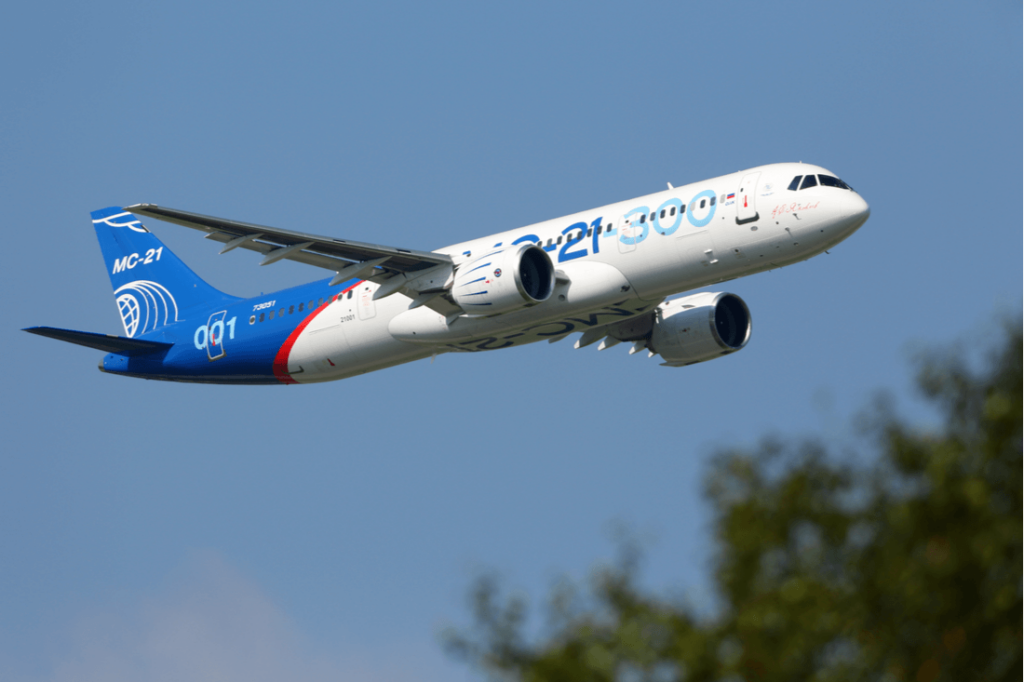The Russian conglomerate United Aircraft Corporation (UAC) is using the MAKS international air show to showcase its airliner in-development, the MC-21. With most prototypes present at the event, the manufacturer signs preliminary orders with three different airlines from the region.
Since the beginning of the MAKS international air show, the Russian conglomerate United Aircraft Corporation (UAC) signed letters of intent with multiple airlines to provide 20 Irkut MC-21 in total. The agreements include ten planes for Kazakh regional airline Bek Air, five for Yakutia, and another five for an undisclosed airline.
This puts the total numbers of MC-21 backlog at 175 firm orders and 150 sales intentions. Around a third of the orders were placed by the Russian state-owned carrier Aeroflot.
There are four flying prototypes of MC-21, three of which are present at MAKS 2019, including one with cabin display. This impressive exhibit shows the high hopes that the Russian conglomerate has for its aircraft, possibly as a way to forget the debacle of the Superjet 100.
Since the Aeroflot accident in which 41 people died in May 2019, the Superjet 100 (formerly Sukhoi Superjet) has been on its way to lose all of its non-Russian operators. In February 2019, the only European airline to use the aircraft, CityJet, has returned it to its owner. More recently, the Mexican airline Interjet made its decision known to let go of its fleet of 22 Superjets.
The MC-21 is a medium-haul plane capable of carrying between 132 and 211 passengers, a prized market segment. It is destined to replace the Tu-154 and Tu-204 in Russia and will compete with two best-sellers, the Boeing 737 and the Airbus A320.
According to UAC head of the civil division Ravil Khakimov, the MC-21 will be 20% cheaper than its western counterparts. Irkut estimates that 30,000 planes of this category will be needed by 2038, including 1,000 in Russia. Eventually, the manufacturer is expected to reach an output of 100 MC-21 per year to meet the market demand, as stated by Deputy Prime Minister Yuri Borisov in January 2019.
For now, the aircraft, which made its maiden flight on May 2017, is still awaiting certification, which should be finalized in 2020. The first deliveries of the aircraft, which have now been delayed for over three years, are scheduled for the second half of 2021.
The program has been plagued with delays that the Russian government mostly attributed to American sanctions. Indeed, the MC-21 composite wing production has been quite challenging. Delivery of parts coming from American Hexcel and Japanese Toray Industries to the Russian company Aerocomposit (part of UAC) was abandoned.
Moreover, the aircraft is currently powered by the American engine Pratt & Whitney PW1400G-JM. The fourth prototype was initially supposed to rely on the Russian engine Aviadvigatel PD-14, but not to delay the program further, the prospect has been abandoned. Rostec is actively looking for alternatives to its U.S. suppliers, with an announced goal to reach a level of indigenous parts in the MC-21 of 97 by 2022, according to Borisov.
As it had been officialized by Russian Prime Minister Dmitri Medvedev in January 2019, Novikombank, a subsidiary of the Russian state-owned holding conglomerate Rostec, intends to pour an additional 10 billion rubles to continue production and certification of the aircraft.

